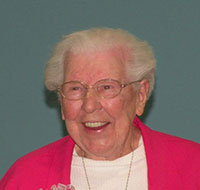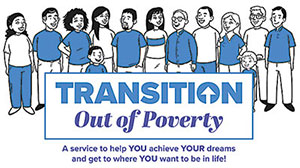 HAYESVILLE — A beloved member of the Immaculate Heart of Mary Mission and St. William Parish communities is being recognized for her substantial contributions to the people of western North Carolina.
HAYESVILLE — A beloved member of the Immaculate Heart of Mary Mission and St. William Parish communities is being recognized for her substantial contributions to the people of western North Carolina.
Sister Therese “Terry” Martin, CND, has a parish hall at IHM named in her honor: Sister Terry Hall. Now there is an endowment set up in her name to benefit students from Clay and Cherokee counties who are pursuing higher education.
The Sister Terry Martin Endowment Fund has been established by Immaculate Heart of Mary Mission in Hayesville as a way to honor her for all her years of service to the parish. The endowment was funded by parishioners through several fundraisers. The initial endowment contribution was a little over $27,000.
The endowment income is to be used for the benefit of students in Clay and Cherokee counties to provide scholarships for higher education. Allocation of these funds will be determined by a five-member scholarship committee.
This year marks Sister Terry’s 70th jubilee anniversary of profession with the Congregation of Notre Dame. She turned 90 in February.
For more than 27 years, Sister Terry has been helping people struggling at the margins in the far western Appalachian counties. In her ministry as the Far Western North Carolina Outreach Worker for the Diocese of Charlotte, based out of Immaculate Heart of Mary Mission in Hayesville, she is a witness to the preferential love of Christ for the poor – bringing food, clothing and other essential items to migrant farm workers; serving as a team member of Catholic Charities’ family strengthening services; visiting the sick; and working with victims at domestic violence shelters in Hayesville and Murphy.
She has also made it her personal task to help children in struggling families have shoes, warm coats and school supplies. She has also helped many adults earn their GED.
Sister Terry has been a volunteer with the Murphy office of Catholic Charities since its founding 19 years ago, working alongside Catholic Charities’ staff and community partners in offering a variety of charity and justice-promoting works out of the Bishop Begley Center for Economic Development in Murphy.
Bob McGinnis, an IHM parishioner who helped spearhead fundraising for the endowment fund, said, “We decided based on her years of involvement in education and her deep concern for both parishes in both counties we would raise money to be given out in her name.”
He said that when Sister Terry entered her religious order, she wanted to be a missionary.
“She was a missionary within the country,” McGinnis explained. “She is the most loving, giving woman I have ever known in my life. When I think of Sister Terry I think of Mother Teresa… She’s had an amazing impact on our community.”
The Sister Terry Endowment Fund will be managed by the Diocese of Charlotte Foundation.
The annual scholarship will be disbursed starting next fall. It will be managed by a committee of five people, a chairperson and two members of both IHM and St. William parishes. They will work with school systems in both counties to invite students to apply for the scholarship. Any high school student from either county going on to higher education may apply.
“Currently almost half of our 260 endowments are named endowments – that is, the endowments were established to honor or remember an individual or individuals,” noted Jim Kelley, diocesan director of development. “Some of these endowments are established at the death of an individual through a will or other estate gift. Others, like the Sister Terry Martin endowment, are established when a group raises some money to honor an individual or individuals. In any event, more and more people are establishing named endowments to leave a legacy to loved ones – gifts from thousands of dollars to millions – and we are thankful for their generosity.”
— SueAnn Howell, senior reporter. Joe Purello of Catholic Charities Diocese of Charlotte contributed.
Learn more
Interested in setting up an endowment? Individuals can establish an endowment in the diocesan foundation by leaving a bequest in their will, a beneficiary designation from a retirement plan, a gift of real estate, a gift of life insurance, cash or securities sufficient to set up an endowment, or a life income arrangement such as a trust or annuity.
For details about setting up an endowment to benefit the Church in western North Carolina, contact Gina Rhodes at 704-370-3364 or email This email address is being protected from spambots. You need JavaScript enabled to view it..
New program aims to lift families out of poverty
 CHARLOTTE — Upholding the dignity of every person is at the core of what Catholic Charities Diocese of Charlotte does every day, and that mission is being reflected even more strongly this year with additional services the agency has incorporated into its food pantry program.
CHARLOTTE — Upholding the dignity of every person is at the core of what Catholic Charities Diocese of Charlotte does every day, and that mission is being reflected even more strongly this year with additional services the agency has incorporated into its food pantry program.
Catholic Charities has shifted from focusing solely on the immediate food crisis to attending to the whole person by providing a wide range of help when they come in – what’s called “wrap-around” services. The initiative is called Transition Out of Poverty, or TOP, and it’s now in place at all three of Catholic Charities’ locations: Asheville, Charlotte and Winston-Salem.
Sharon Davis, Program Assurance Director for Catholic Charities, notes that Catholic Charities staff were seeing people repeatedly coming back to their food pantries for help. Clearly, she said, they needed to get to the root causes of their plight and provide more effective help so they could become self-sufficient.
Spurring their efforts is the area’s persistent poverty rate: in 16 counties of the diocese, the poverty rate is higher than the national average of 14.6 percent, and in some counties, the poverty rate for children is as high as 40 percent.
Over the past two years, Catholic Charities’ food pantries have given out 1.1 million pounds of food to 28,515 people. But Catholic Charities leaders have recognized the urgent need to do more to reduce poverty in the diocese.
TOP assesses a family’s needs in five areas: access to food, access to affordable health care, safe and affordable housing, opportunities for adults who need education, and employment.
Participating TOP families receive a month’s worth of food, but going a step further, Catholic Charities pairs each family with highly-trained volunteers case – someone who will be there to offer support, guidance and education. Both the family and the volunteer also benefit from the guidance of Catholic Charities’ professional staff.
“This work means that the community of faith will walk side by side for the right of all to have food, education, housing, health care and employment and to make a living wage to provide for their families,” Davis notes.
TOP enables Catholic Charities to accompany, assist and strengthen each family they serve, fulfilling its mission to “strengthen families, build communities and reduce poverty.”
“TOP offers individuals and families the opportunity to receive a customized path out of poverty,” Davis says.
“Catholic Charities values the totality of the human person as an integral component of service delivery. We help families to focus on these areas by making sure they have access to healthy, nutritious food from our pantry. As one of the most basic human needs, food security – having reliable access to a sufficient quantity of affordable, nutritious food – is a critical component of wrap-around services,” she says.
Without first having adequate food and shelter, people in need cannot escape from poverty even with Catholic Charities’ best efforts. “It is compassionate and humane to address the food security of those who come to Catholic Charities,” Davis says.
Volunteer Deb Kapopoulos says, “As one of the volunteer receptionists, I really see the value in the Transition Out of Poverty program. Our new TOP program allows us to serve our participants more personally than the previous, walk-in food pantry.
“The appointment-based structure gives the participant the flexibility to schedule appointments based on their needs. And it enables us to organize our daily schedule in a way that gives each client time to discuss other issues that they are struggling with. I really like the one-on-one client interaction,” she says.
TOP volunteer Rick Lober retired from a 28-year career in law enforcement and now serves as a mentor for the program.
“I went to the initial orientation presentation in my parish and thought this might be a good transition in my desire to serve and put my faith into action,” Lober says. “I was intrigued by the program’s evolution from primarily a food pantry to a more personal approach, to learn about the incredible persons who need essential food needs and yet seek to become more self-sufficient and improve the lives of their family and themselves.”
“The key is helping them to take the initiative to define those goals and ways to achieve one or more of them. Often, it is done in ‘baby steps’ that we track and encourage. I love their appreciation that someone takes an active interest in her or him,” he says.
Participating TOP families open their hearts and souls to the volunteers because they see them as non-judgmental, caring people who truly care about them as a person – not a number, he adds.
“People wish they didn’t need help, but they greatly appreciate someone helping them and assisting them to find ways out of their situation – whether small or large,” he says.
“By choosing to live our faith and not just practice our faith, the women and men involved with TOP have been given a special opportunity to follow the Gospel’s path of helping the poor, needy, sick, children, destitute and others,” he says.
“Working to end poverty isn’t just something that will help those affected,” adds Davis. “This affects the greater good. Catholic Charities is doing more. The professional staff, and the compassion and dedication of volunteers, all work together to be the hands and feet of the Lord to help people be who they are called to be.”
— SueAnn Howell, senior reporter
Want to help?
Catholic Charities needs many volunteers to run the Transition Out of Poverty program as well as donations to meet the increased need for food. Volunteer roles include those wishing to work directly with program participants as a coach or guide (intensive training provided), receptionists, intake and assessment volunteers, food packers and shoppers. If you’re interested in lending a hand, go online to www.ccdoc.org to get details.

